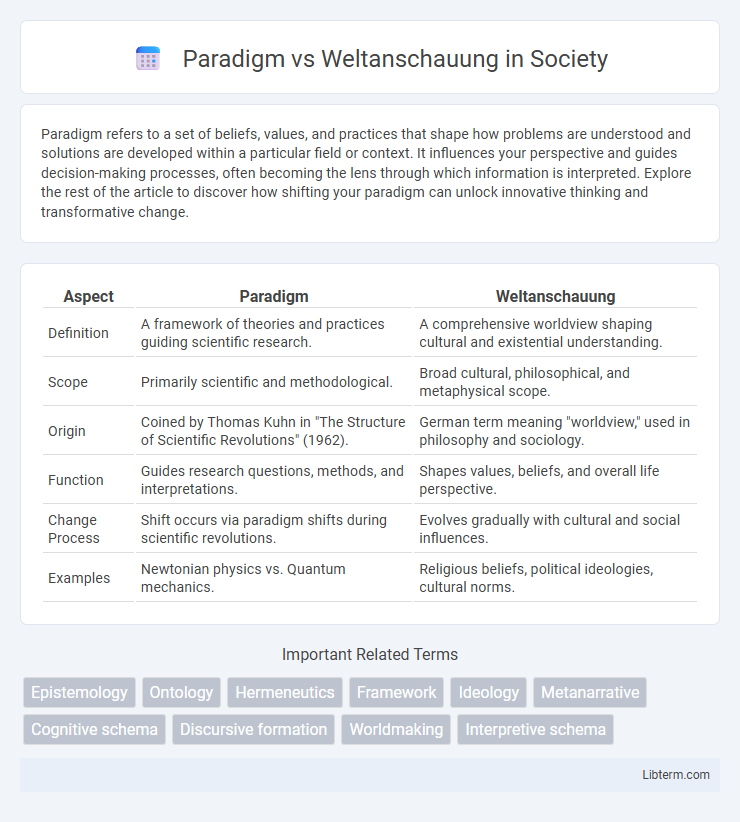Paradigm refers to a set of beliefs, values, and practices that shape how problems are understood and solutions are developed within a particular field or context. It influences your perspective and guides decision-making processes, often becoming the lens through which information is interpreted. Explore the rest of the article to discover how shifting your paradigm can unlock innovative thinking and transformative change.
Table of Comparison
| Aspect | Paradigm | Weltanschauung |
|---|---|---|
| Definition | A framework of theories and practices guiding scientific research. | A comprehensive worldview shaping cultural and existential understanding. |
| Scope | Primarily scientific and methodological. | Broad cultural, philosophical, and metaphysical scope. |
| Origin | Coined by Thomas Kuhn in "The Structure of Scientific Revolutions" (1962). | German term meaning "worldview," used in philosophy and sociology. |
| Function | Guides research questions, methods, and interpretations. | Shapes values, beliefs, and overall life perspective. |
| Change Process | Shift occurs via paradigm shifts during scientific revolutions. | Evolves gradually with cultural and social influences. |
| Examples | Newtonian physics vs. Quantum mechanics. | Religious beliefs, political ideologies, cultural norms. |
Defining Paradigm: Concept and Origin
A paradigm is a fundamental framework of scientific theories and methods that shapes research and knowledge development, originally defined by Thomas Kuhn in his 1962 work *The Structure of Scientific Revolutions*. It represents a set of shared beliefs, values, and techniques within a scientific community that guide problem-solving and interpretation of data. Paradigms evolve through revolutionary shifts, marking profound changes in scientific understanding and practice.
Weltanschauung: Meaning and Historical Context
Weltanschauung refers to a comprehensive worldview or philosophy of life that shapes an individual's or society's perception of reality, encompassing beliefs, values, and emotions. Originating from German philosophical discourse in the 19th century, it gained prominence through thinkers like Wilhelm Dilthey and Hans-Georg Gadamer, emphasizing the interpretive nature of human experience. Historically, Weltanschauung has influenced cultural, social, and ideological frameworks, providing a foundational lens through which entire civilizations understand existence and their place in the world.
Philosophical Roots of Paradigm and Weltanschauung
The philosophical roots of paradigm stem from Thomas Kuhn's theory of scientific revolutions, emphasizing structured frameworks that guide scientific inquiry and knowledge progression. Weltanschauung, originating from German philosophy, refers to the comprehensive worldview shaped by cultural, historical, and individual experiences, reflecting a holistic perception of reality. Both concepts address ways humans understand and interpret the world but differ in scope, with paradigms focusing on scientific structures and weltanschauung encompassing broader existential and cultural perspectives.
Paradigm in Scientific Inquiry
In scientific inquiry, a paradigm represents a framework of theories, methods, and standards that guide research and experimentation, shaping how scientists interpret data and solve problems. Paradigms establish consensual knowledge within scientific communities, enabling reproducibility and cumulative progress. Unlike Weltanschauung, which denotes a broader worldview or philosophical outlook, paradigms strictly structure empirical investigation and the development of scientific knowledge.
Weltanschauung in Cultural and Social Thought
Weltanschauung, a German term meaning "worldview," represents the comprehensive framework through which individuals and societies interpret their experiences, shaping cultural norms, values, and social behaviors. Unlike paradigms, which are often confined to scientific or epistemological models, Weltanschauung encompasses broader cultural and social thought, influencing collective identities and moral perspectives within communities. Its role in cultural and social theory highlights how shared worldviews drive cohesion, conflict, and transformation in societies across historical and contemporary contexts.
Key Similarities Between Paradigm and Weltanschauung
Paradigm and Weltanschauung both represent comprehensive frameworks guiding how individuals interpret and understand reality, shaping perceptions and interpretations within specific cultural or scientific contexts. Each concept functions as a lens through which knowledge and experiences are organized, influencing cognition, behavior, and worldview formation. Both serve as foundational structures that determine the boundaries and methods of inquiry or thought within their respective domains.
Fundamental Differences: Paradigm vs. Weltanschauung
A paradigm refers to a structured framework of scientific theories and methods guiding research within a discipline, while Weltanschauung embodies a broad worldview encompassing cultural, philosophical, and existential perspectives. Paradigms are specific to empirical inquiry and evolve through shifts in scientific consensus, whereas Weltanschauung influences overall interpretation of reality and human experience beyond scientific contexts. The fundamental difference lies in paradigms shaping methodological approaches to knowledge, while Weltanschauung shapes overarching worldview and meaning.
Influence on Worldview and Knowledge Formation
Paradigm shapes scientific inquiry by establishing a framework of accepted methods and standards, directly influencing knowledge formation through empirical evidence and reproducible results. Weltanschauung, a broader cultural and philosophical perspective, deeply impacts an individual's worldview by integrating values, beliefs, and metaphysical assumptions that transcend specific scientific disciplines. Together, paradigms govern objective knowledge structures, while weltanschauung embeds subjective interpretations, collectively guiding how reality is understood and knowledge is constructed.
Real-World Examples of Paradigm and Weltanschauung
The concept of a paradigm is exemplified by the shift from Newtonian mechanics to Einstein's theory of relativity, illustrating a fundamental change in scientific approach and understanding. Weltanschauung, a German term for worldview, is captured in the contrast between the Enlightenment's emphasis on reason and progress and traditional indigenous cosmologies that prioritize harmony with nature. These real-world examples highlight how paradigms drive methodological frameworks in science, while Weltanschauung shapes broader cultural and existential perspectives.
Implications for Future Research and Understanding
Paradigm shifts redefine scientific frameworks by establishing standardized methodologies and criteria, driving focused experimental designs and cumulative knowledge growth. In contrast, Weltanschauung encompasses broader cultural and philosophical worldviews shaping interpretative lenses and value systems across disciplines, influencing interdisciplinary research and holistic understanding. Future research benefits from integrating paradigm-specific precision with Weltanschauung-based contextual awareness, fostering innovative approaches that address complex, multifaceted problems.
Paradigm Infographic

 libterm.com
libterm.com